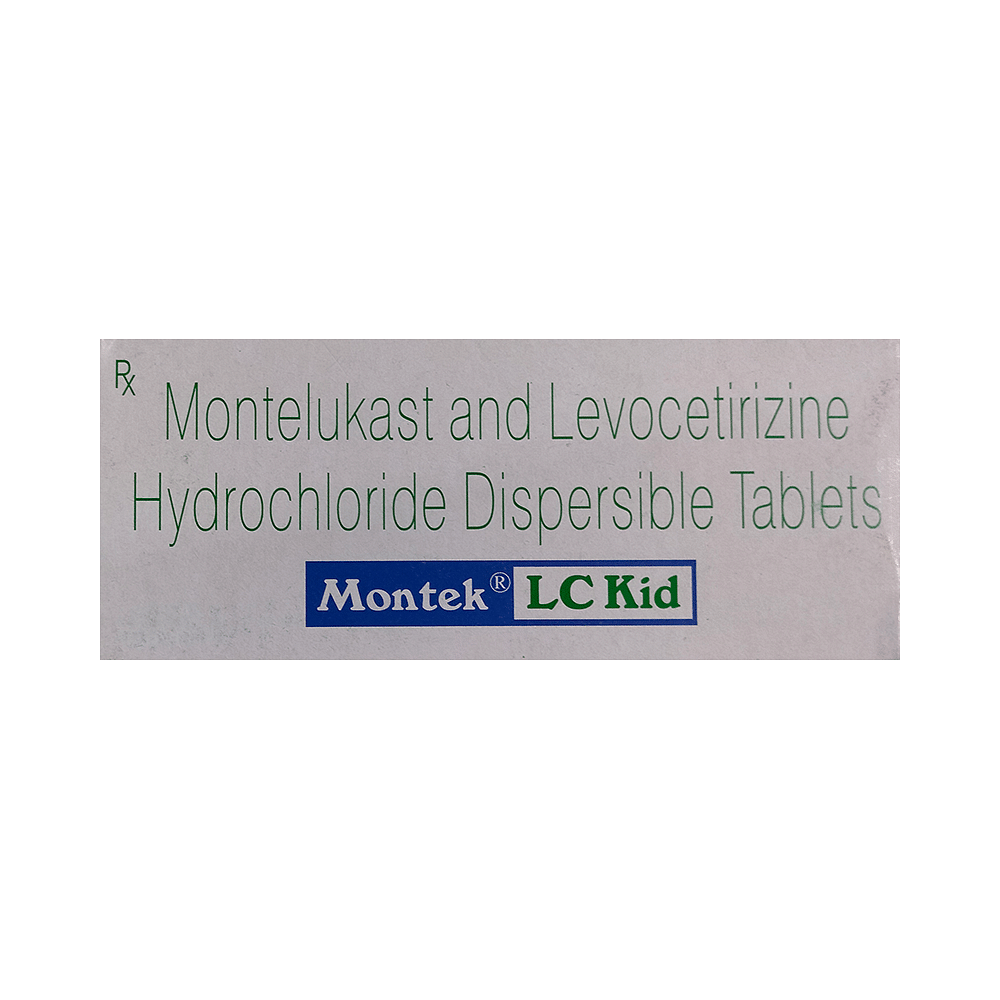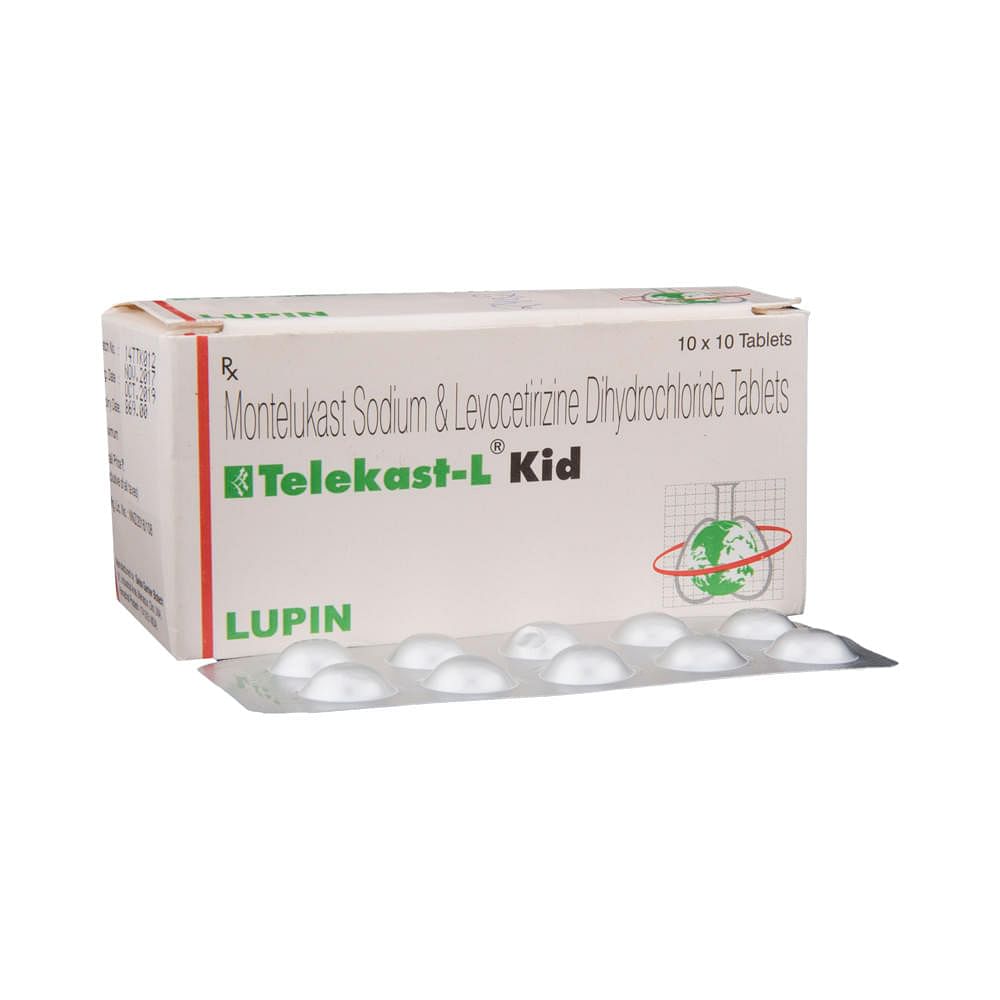
Montas-L KId 2.5mg/4mg Tablet
Manufacturer
Intas Pharmaceuticals Ltd
Salt Composition
Levocetirizine (2.5mg) + Montelukast (4mg)
Key Information
Short Description
Montas-L KId 2.5mg/4mg Tablet is commonly prescribed in children to treat symptoms of allergy such as runny nose, sneezing, itching, swelling, congestion, and watery eyes.
Dosage Form
Tablet
Introduction
Montas-L KId 2.5mg/4mg Tablet is commonly prescribed in children to treat symptoms of allergy such as runny nose, sneezing, itching, swelling, congestion, and watery eyes. It may also help in the treatment of asthma and skin allergies.
Directions for Use
Take this medicine in the dose and duration as advised by your doctor. Swallow it as a whole. Do not chew, crush or break it. Montas-L KId 2.5mg/4mg Tablet may be taken with or without food but it is better to take it at a fixed time.
Safety Information
Side Effects
No common side effects listed.
Alcohol Warning
Montas-L KId 2.5mg/4mg Tablet may cause excessive drowsiness with alcohol.
Breastfeeding Warning
Montas-L KId 2.5mg/4mg Tablet is probably safe to use during breastfeeding. Limited human data suggests that the drug does not represent any significant risk to the baby.
Pregnancy Warning
Montas-L KId 2.5mg/4mg Tablet is generally considered safe to use during pregnancy. Animal studies have shown low or no adverse effects to the developing baby; however, there are limited human studies.
How it works
Montas-L KId 2.5mg/4mg Tablet contains Levocetirizine and Montelukast. Together these two relieve sneezing and runny nose caused due to allergies. Levocetirizine is an antiallergic that blocks a chemical messenger (histamine) responsible for runny nose, watery eyes, and sneezing. Montelukast is a leukotriene antagonist. It works by blocking another chemical messenger (leukotriene). This reduces inflammation (swelling) in the airways and nose and improves symptoms.
Quick Tips
Never combine Montas-L KId 2.5mg/4mg Tablet with other cold and flu medicines as that may have side effects. Montas-L KId 2.5mg/4mg Tablet helps prevent asthma attacks. Never use it to stop an attack that has already started as it will not help. If you are giving Montas-L KId 2.5mg/4mg Tablet to your child for asthma or allergy you need not give another dose to prevent exercise-induced breathing problems. In case of any confusion consult your child’s doctor as soon as possible. Make sure that you always have enough medicine. Practice self-care tips: Abstain your child from coming in contact with allergens Encourage your child to wear a face mask and avoid dusty places Give plenty of fluids as it helps in thinning and loosening the mucus in the lungs.
Related Medicines

Montek LC Kid Tablet

Telekast-L Kid Tablet

Viokast-Kid Tablet

Lukast LC Kid 2.5mg/4mg Tablet

Eliff-M Kid Tablet

Lycit-M Kid Tablet

Lemoleb Kid Tablet

Lucotriz LC Kid 2.5mg/4mg Tablet

Montesync Kid 2.5mg/4mg Tablet

Toset M Kid 2.5mg/4mg Tablet
Frequently asked questions
Can I give my child cough and allergy medicine together? Why or why not?
No. Mixing cough and allergy medications is not recommended because they often contain similar ingredients, potentially leading to double-dose effects and serious side effects. It is crucial to follow your doctor's instructions regarding medication combinations.
My child feels better, can I decrease the dose of Montas-L KId 2.5mg/4mg Tablet? Why or why not?
No, you should adhere to your child's doctor's prescribed dosage for Montas-L KId 2.5mg/4mg Tablet. Do not adjust the dose on your own as this could impact their health and lead to complications.
How should Montas-L KId 2.5mg/4mg Tablet be stored? Why is this important?
Montas-L KId 2.5mg/4mg Tablet should be kept at room temperature in a dry, cool location away from direct sunlight and heat. Storing it properly prevents degradation and ensures its effectiveness.
Does Montas-L KId 2.5mg/4mg Tablet make my child sleepy? How can I manage this?
Montas-L KId 2.5mg/4mg Tablet may cause mild drowsiness, which could lead to sleepiness in children. However, this medication should never be given to induce sleep; instead, focus on addressing underlying sleep disorders.
I'm planning for a sports competition for my child in the next few days. Can they start Montas-L KId 2.5mg/4mg Tablet? Why or why not?
It is important to consult with your child's doctor before starting any new medication, especially during training periods. The potential side effects of this medication could affect their performance.
Can I stop taking Montas-L KId 2.5mg/4mg Tablet abruptly? Why or why not?
Stopping the medication abruptly can lead to a sudden relapse of symptoms, as your child may experience withdrawal symptoms such as rebound reversal of all symptoms. Therefore, it's crucial to discontinue this medication under the guidance of your doctor.
My child experiences mood disorders. Can they take Montas-L KId 2.5mg/4mg Tablet? Why or why not?
Montas-L KId 2.5mg/4mg Tablet is associated with potential mood changes, including hallucinations, depression, anxiety, suicidal thoughts, shakiness, and difficulty controlling bodily movements in some individuals. Consult your child's doctor before administering any medication.
Can Montas-L KId 2.5mg/4mg Tablet be used to treat acute asthma attacks? Why or why not?
Montas-L KId 2.5mg/4mg Tablet is primarily for preventing asthma attacks and should not be used as a treatment for an ongoing attack. Relieving medication should be used instead.


